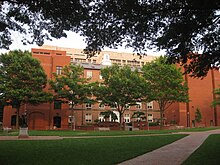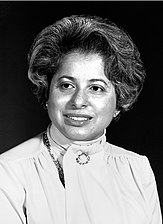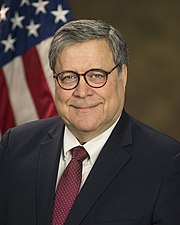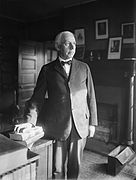George Washington University Law School
| George Washington University Law School | |
|---|---|
 | |
| Parent school | George Washington University |
| Established | 1865[1] |
| School type | Private |
| Parent endowment | $2.8 billion |
| Dean | Dayna Bowen Matthew[2] |
| Location | Washington, D.C., U.S. |
| Enrollment | 1,646 (2016)[3] |
| Faculty | 371 (2016)[3] |
| USNWR ranking | 41st (2024)[4] |
| Bar pass rate | 97.19%[5] |
| Website | law.gwu.edu |
| ABA profile | Standard 509 Report |
 | |
The George Washington University Law School (GW Law) is the law school of George Washington University, in Washington, D.C. Established in 1865, GW Law is the oldest law school in Washington, D.C.[7][8]
History
[edit]19th century
[edit]The George Washington University Law School was founded in the 1820s but closed in 1826 due to low enrollment.[7] The first two professors were William Cranch, chief justice of the Circuit Court for the District of Columbia and William Thomas Carroll, a descendant of Charles Carroll the Settler and clerk of the U.S. Supreme Court from 1827 until his death in 1863.[9] The law school was reestablished in 1865 and was the first law school in the District of Columbia.[7]
Law classes resumed in 1865 in the Old Trinity Episcopal Church, and the school graduated its first class of 60 students in 1867.[1] The Master of Laws degree program began in 1897.[1]

20th century
[edit]In 1900, the school was one of the founding members of the Association of American Law Schools.[1][10]
GW Law has one of the oldest intellectual property programs in the US. Its alumni have contributed to various technological advancements, including involvement in the patent for the Wright brothers' flying machine, granted on May 22, 1906.[11]

The school was accredited by the American Bar Association in 1923.[12]
In 1954, it merged with National University School of Law.[1] The law school operated under the name National Law Center for the 37 years from 1959 to 1996, when it was renamed George Washington University Law School.[13].
Academics
[edit]Curriculum
[edit]J.D. students are required to take courses on civil procedure, criminal law, constitutional law, contracts, introduction to advocacy, legal research and writing, professional responsibility and ethics, property, and torts.[14]
GW Law also offers numerous summer programs, including a joint program with the University of Oxford for the study of international human rights law at New College, Oxford each July.[15]
Student recognition
[edit]Instead of supplying students with individual class rankings, the top 1–15% of the class are designated as George Washington Scholars, while the top 16–35% of the class are designated as Thurgood Marshall Scholars.[16]
Publications
[edit]GW Law publishes ten journals:[17]
- The George Washington Law Review
- The George Washington International Law Review
- The George Washington Business & Finance Law Review
- The Federal Circuit Bar Journal
- The American Intellectual Property Law Association Quarterly Journal
- The Public Contract Law Journal
- The Federal Communications Law Journal
- George Washington Journal of Law & Technology
- The Journal of Energy and Environmental Law
- International Law in Domestic Courts Journal
Student life
[edit]In the 2018–19 academic year, GW Law had 1,525 J.D. students, of which 25% were minorities and 51% were female.[18][needs update]
Students enrolled in the J.D. program come from 206 colleges and 11 countries.[19] The law school also enrolls students from approximately 45 countries each year in its Master of Laws and Doctor of Juridical Science degree programs.[20]
GW Law students can participate in 60 student groups.[21]
Campus
[edit]
GW Law is located in Washington's Foggy Bottom neighborhood, across the street from the World Bank and International Monetary Fund headquarters, and a few blocks away from the State Department and the White House.[22]
The Jacob Burns Law Library holds a collection of more than 700,000 volumes.[23]
The law school currently occupies nine buildings on the main campus of The George Washington University. The law school's main complex comprises five buildings anchored by Stockton Hall (1924) located on the University Yard, the central open space of GW's urban campus. Renovated extensively between 2001 and 2003, these buildings adjoin one another, have internal passageways, and function as one consolidated complex. Three townhouses directly across from the main complex house the Community Legal Clinics, Student Bar Association, and student journal offices.
Admissions
[edit]For the class entering in the fall of 2019, 2,488 out of 8,019 J.D. applicants (31%) were offered admission, with 489 matriculating. The 25th and 75th LSAT percentiles for the 2019 full-time entering class were 160 and 167, respectively, with a median of 166.[24] The 25th and 75th undergraduate GPA percentiles were 3.40 and 3.84, respectively, with a median of 3.74.[18]
Rankings and reputation
[edit]
In 2024, U.S. News & World Report ranks GW Law as the 41st top law school out of 196 in the United States.
According to Brian Leiter's law school rankings, GW Law ranked 17th in the nation for Supreme Court clerkship placement between 2003 and 2013,[25][needs update] 19th in terms of student numerical quality,[26][needs update] and 16th for law faculties with the most "scholarly impact" as measured by numbers of citations.[27][needs update]
Post-graduation employment
[edit]According to GW Law's official 2019[needs update] ABA-required disclosures, 73.6% of the Class of 2019 obtained full-time, long-term, bar passage-required, non-school funded employment ten months after graduation.[28]
GW Law's Law School Transparency under-employment score is 12.1%, indicating the percentage of the Class of 2019 unemployed, pursuing an additional degree, or working in a non-professional, short-term, or part-time job ten months after graduation.[29] 0.6% of graduates were in school-funded jobs. 89.5% of the Class of 2019 was employed in some capacity, 1.4% were pursuing a graduate degree, and 6.8% were unemployed and seeking employment.[28]
Costs
[edit]The total cost of full-time attendance (indicating the cost of tuition, fees, and living expenses) at GW Law for the 2024-2025 academic year was $106,471.[30] GW Law's tuition and fees on average increased by 4.1% annually over the past five years.[31]
The Law School Transparency estimated debt-financed cost of attendance for three years is $328,263.[31] The average indebtedness of the 76% of 2013 GW Law graduates who took out loans was $123,693.[32]
Notable people
[edit]- Notable Alumni of the GW Law School
-
Belva Ann Lockwood, first woman to argue before the U.S. Supreme Court
-
Hsu Mo, founding judge of the International Court of Justice
-
J. Edgar Hoover, 1st director of the Federal Bureau of Investigation
-
Patricia Roberts Harris, first African American woman to serve in the U.S. Cabinet
-
Allen Dulles, Longest serving Director of the CIA
-
Former U.S. Senator J. William Fulbright, founder of the Fulbright Program
-
Former U.S. Senator Harry Reid, former Senate Majority Leader
-
David Bernhardt, 53rd Secretary of the Interior
-
Russell Vought, Director of Office of Management and Budget
-
Dan Glickman, former Chairman and CEO of the Motion Picture Association of America, former United States Secretary of Agriculture, and former U.S. Congressman from Kansas
-
Mikheil Saakashvili, President of Georgia
Notable faculty
[edit]Notable faculty members include:
- Clarence Thomas[33]
- John Banzhaf
- Jerome A. Barron
- Paul Schiff Berman
- Thomas Buergenthal
- Steve Charnovitz
- Mary Cheh
- Donald C. Clarke
- Lawrence Cunningham
- William Kovacic
- Alan Morrison
- Ralph Oman
- Richard J. Pierce
- Randall Ray Rader
- Charles Henry Robb
- Jeffrey Rosen
- Catherine J. Ross
- Lisa M. Schenck
- Jonathan Turley
- Daniel Solove
-
David J. Brewer, U.S. Supreme Court Associate Justice
-
Willis Van Devanter, former U.S. Supreme Court Associate Justice
-
John Marshall Harlan, former U.S. Supreme Court Associate Justice
-
GW Law professor Clarence Thomas, Justice of the U.S. Supreme Court
-
FAMRI Dr. William Cahan Distinguished Professor John F. Banzhaf III; legal activist; devised the Banzhaf power index
-
Former Elyce Zenoff Research Professor of Law (1979) Mary Cheh in 2010; elected D.C. councilwoman
-
GW Law professor Thomas Buergenthal, former judge of the International Court of Justice
-
GW Law professor Jeffrey Rosen, National Constitution Center chair and CEO; constitutional law journalist and commentator
-
GW Law professor and constitutional lawyer, Jonathan Turley
References
[edit]- ^ a b c d e "History". GW Law. Archived from the original on July 17, 2015. Retrieved July 14, 2014.
- ^ "GW Names New Law Dean". GW Law. February 19, 2020.
- ^ a b "George Washington University – 2016 Standard 509 Information Report" (PDF). Archived (PDF) from the original on May 17, 2016. Retrieved July 6, 2016.
- ^ "George Washington University". U.S. News & World Report – Best Law Schools. Retrieved April 10, 2024.
- ^ "Archived copy". Archived (PDF) from the original on February 26, 2023. Retrieved March 28, 2023.
{{cite web}}: CS1 maint: archived copy as title (link) - ^ "2020 Law School Rankings - Acceptance Rate (Low to High)". Archived from the original on September 22, 2021. Retrieved September 22, 2021.
- ^ a b c "Showing Our Strengths: The History and Future of GW Law". GW Law. Archived from the original on July 14, 2014. Retrieved July 14, 2014.
- ^ "USNews – Best Law Schools". Archived from the original on March 16, 2018. Retrieved March 23, 2018.
- ^ "A Legal Miscellanea". Archived from the original on December 20, 2016. Retrieved January 7, 2017.
- ^ "Member and Fee-Paid Schools". The Association of American Law Schools. Archived from the original on July 17, 2012. Retrieved July 14, 2014.
- ^ "Showing Our Strengths". Archived from the original on November 21, 2016. Retrieved January 7, 2017.
- ^ "Alphabetical School List". American Bar Association. Archived from the original on February 23, 2015. Retrieved July 14, 2014.
- ^ "GW Law: 150 Years of Making History, pp.12–13". September 24, 2015. Archived from the original on July 11, 2020. Retrieved June 11, 2018.
- ^ "Required J.D. Curriculum". GW Law. Archived from the original on July 16, 2014. Retrieved July 15, 2014.
- ^ "GW-Oxford Summer Program". GW Law. Archived from the original on January 8, 2017. Retrieved January 7, 2017.
- ^ "Academic Recognition and Grade Representation Policy". GW Law. Archived from the original on November 9, 2014. Retrieved July 21, 2014.
- ^ "Publications". GW Law. Archived from the original on July 21, 2014. Retrieved July 22, 2014.
- ^ a b "2019 Standard 509 Information Report" (PDF). American Bar Association. December 4, 2019. Archived (PDF) from the original on December 15, 2018. Retrieved December 12, 2018.
- ^ "Welcome New Students". GW Law. Retrieved August 19, 2010. [dead link]
- ^ "Admissions". GW Law. Archived from the original on January 5, 2016. Retrieved July 21, 2014.
- ^ "Students Organizations". GW Law. Archived from the original on August 2, 2014. Retrieved July 21, 2014.
- ^ "DC & GW". GW Law. Archived from the original on August 2, 2014. Retrieved July 21, 2014.
- ^ "Jacob Burns Law Library". GW Law. Archived from the original on July 23, 2014. Retrieved July 21, 2014.
- ^ "George Washington University – 2019 Standard 509 Information Report" (PDF). December 4, 2019. Archived (PDF) from the original on December 15, 2018. Retrieved December 13, 2018.
- ^ "Supreme Court Clerkship Placement, 2003 Through 2013, 2013". Brian Leiter's Law School Rankings. Archived from the original on September 19, 2014. Retrieved July 21, 2014.
- ^ "2010 Ranking of Student Bodies By Numerical Quality". Brian Leiter's Law School Rankings. Archived from the original on September 15, 2011. Retrieved July 21, 2014.
- ^ "Top 70 Law Faculties In Scholarly Impact, 2007–2011". Brian Leiter's Law School Rankings. Archived from the original on November 23, 2021. Retrieved July 21, 2014.
- ^ a b c "Employment Summary for 2019 Graduates" (PDF). GW Law. Archived (PDF) from the original on July 29, 2020. Retrieved May 30, 2020.
- ^ "George Washington University". www.lstreports.com. Archived from the original on May 13, 2019. Retrieved May 8, 2018.
- ^ "Cost of Attendance | GW Law | the George Washington University".
- ^ a b "George Washington University Profile, Costs". Law School Transparency. Archived from the original on March 28, 2019. Retrieved May 8, 2018.
- ^ "Which law school graduates have the most debt?". U.S. News & World Report. Archived from the original on July 22, 2014. Retrieved July 21, 2014.
- ^ "Clarence Thomas | GW Law | The George Washington University". GW Law. Archived from the original on May 3, 2019. Retrieved May 3, 2019.


























